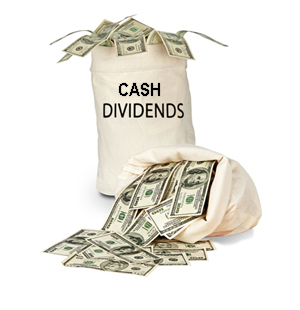Cash Dividend Definition

This page looks at a cash dividend definition along with other corporate actions that you could receive from the stocks you own. What exactly is a cash dividend? Can you receive dividends in other ways?
First off, the cash dividend definition: A cash dividend is a payment you receive for owning shares in a particular company or security. Cash dividends are paid on a per share basis.
For example, if you owned shares in Johnson and Johnson (JNJ) then you would receive 80 cents per share every quarter (2016 dividend). So if you had 1,000 shares in JNJ then you would currently receive $800 every quarter.
Most large companies in the US pay their dividends every quarter. JNJ make their payment every March, June, September, and December.
JNJ have also raised their dividend for 54 straight years and have a healthy dividend payout ratio so the chances look good that those rising dividends should continue for the foreseeable future. Some companies - for example Disney (DIS) - pay semi-annual dividends. Disney currently pay in January and July.
Normally the cash dividend is declared by a board of directors. The board decide what percentage of the firm's profits should be paid out to shareholders in the form of a cash dividend and how much should be used to invest back into the business, pay down debt, make acquisitions or buy back the stock.
To pay sustainable dividends, the company must generate the cash to make the payments. This means consistent dividend payers tend to be consistent cash generators. We love cash generators!
We have outlined a cash dividend definition above but how else can a company pay you?
Some companies can pay you a stock dividend.
A stock dividend differs from a cash dividend in that it pays you in more shares of the company rather than cash. Generally this is paid as a fraction or portion per existing share. For example, if you were paid 0.03 shares for every share you owned and you had 1,000 shares then you'd receive 30 new shares.
Why might a company pay a stock dividend?
It is almost certainly because they want to preserve cash so they don't want to pay out a cash dividend but are still seen to be "rewarding" their shareholders with new shares.
There is also a tax advantage in that these new shares are not taxed until the investor sells the shares (they become part of your capital gain liability rather than your income liability).
A stock dividend does, however, dilute your existing shareholding and, in a similar way to a regular cash dividend dropping the price of a stock when it goes ex-dividend, the same drop in price should happen with a stock dividend.
A stock split is like a giant stock dividend. Often you'll see companies doing, say, a two for one stock split. This means you will get two shares for every share you own. For example, if you'd bought 125 shares in Coca-Cola in 2011, you'd now have 250 shares despite never buying another share. The reason is that they did a two for one stock split in July 2012.
Why might a company do a stock split?
Often it is to try to lower the price - all things being equal a two for one stock split will halve the stock price. Management often view a lower stock price as making the stock more liquid therefore enabling smaller investors to purchase stock more easily. It can also mean it is easier for management to use stock to reward employees or use for acquisitions.
Warren Buffett's Berkshire Hathaway illustrates this perfectly. Buffett has famously never done a stock split on the class A shares of Berkshire Hathaway (BRK-A). One share will now set you back around $260,000! He did however do stock split on the class B (BRK-B) shares to help facilitate the acquisition of the Burlington Northern Santa Fe railroad in 2010.
At RetireOnDividends.com we like to focus on cash dividends. These are the regular checks that turn up in your mailbox or brokerage account and reward you from the profits of a firm. We think they help you focus on the underlying business and a regular cash payment over a long period of time gives you "proof" that the company you own is cash generative.
We hope this answers your questions on a cash dividend definition as opposed to other possible dividends/corporate actions.
For another cash dividend definition, click here!
Got a BURNING dividend question for 6-figure dividend earner Mike Roberts?
What is it that you really want to know about investing?
Submit a query and Mike will write a page in response.
PLEASE NOTE - in accordance with our terms of use, responses are meant for education / interest only. We do not give specific financial advice.



